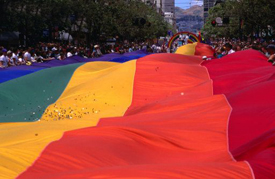Pioneering My Daily Suburban Pride Parade
I am Out. Very, very out. And I live in Suburbia. I was prepared for the two existences not to mesh. After all, I see an average of one rainbow sticker every two weeks, and I sometimes have to dash to Trader Joe’s whether I need groceries or not, because I know I will probably be able to get an LGBT fix. The last time I was there, we were out in force. For my neighborhood, that means six “nearly positives” and one “maybe” in spiked hair and leather wristbands. I had my four-year-old with me. I told him, “See, honey, there are other gay people up here!”

Still, I do often feel like I am alone, a pioneer in my gayness. Webster’s Dictionary defines a pioneer as “A person or group that originates or helps open up a new line of thought or activity,” and, “One of the first to settle in a territory.” I cannot quote Oh! Pioneer! but I do know the words to The Gay and Lesbian Pride Parade Song, which I find myself humming as I walk a kind of one-woman Pride Parade around San Diego. But I have other ways of staking my claim.
At the grocery store, in exchange for my change, I often give the clerk a smile and say, “Remember, another lesbian spent money here today.” The response is usually a blank stare. I believe they are processing. That is what I want. Sometimes I modify my greeting, as when I do a small kindness for someone. As they say “thank you,” my “you’re welcome” is followed quickly by a bright, “Remember, a lesbian was kind to you today.”
Once, I addressed an apparently hard-of-hearing man and I found myself shouting across the Von’s Grocery store parking lot, “I said… Remember, a lesbian was kind to you today!” By the looks from the other shoppers, I gathered I had reached a few extra people that time. I blushed…I really did. But I was proud.
At a Pier I in Carmel Mountain Ranch, a neighboring suburbia, my gaydar went into “tilt” at a young man shopping —off to college or something— with his mother. As they took his plush pillows and scented candles to the register, I completed my transaction and hit the saleswoman with my lesbian greeting. I wanted that young man to hear something I could never have imagined encountering in my suburban youth. If he didn’t need it, fine. I needed to say it. Whatever we were all experiencing, I certainly had their attention. The clerk started to reply, stammered, started, stammered, while I waited patiently and the boy and his mother unabashedly stared. Finally, she spit out happily, “Oh, I think that happens every day.”
Good answer.
I have learned by living in suburban San Diego that there are still many, many people here who do not know of even one out gay person in their lives. Maybe those teenage boys at the mall who were using “gay” as a way to insult each other had never heard a mom-style lecture on their choice of language from a lesbian coming out to them in a candy store. That day, as with most days, it has felt right for me to be that out person for someone, for some small moment. I hope it opens up something for those with whom I interact. I know it expands my world.
It is not enough for us to be “everywhere,” we need to be known. When the first Black families moved into suburbia, it was known. It was something. As LGBT people, invisibility can be invoked in favor of safety -something I acknowledge that other minorities, for better and often for worse, cannot employ. At the same time that I hate this, I grudgingly heed it, for myself and my children. But when it is about shame or discomfort, mine or the other party’s, I am out, a little loud, cheerful, and proud.
I am grateful to the pioneers who came before me –to all the others who have come out and stayed out in their families and careers; those who have made our “gay meccas” like Hillcrest and surrounding neighborhoods into the beautiful home and source of Pride for others to carry into what can be, as it often is for me, the “Lesbeyond.” You are possibly one of them, and I thank you. I take you with me around my suburban world, on the daily route of my personal Pioneer Pride Parade.
Information published on The Rainbow Babies website is not a substitute for proper medical advice, diagnosis, treatment or care. Always seek the advice of a physician or other qualified health providers with any questions you may have regarding a medical condition.
Disclaimer: The Rainbow Babies provides sample contracts and legal/social health articles for informational purposes only—please do not consider it as legally-binding advice of any kind.


